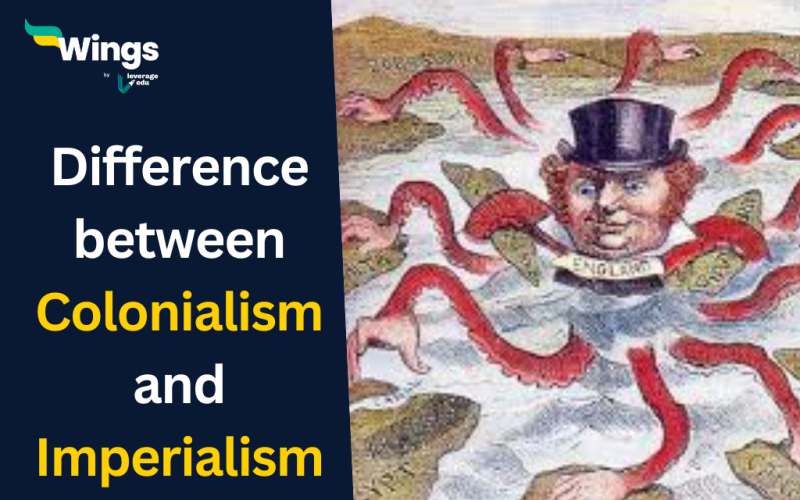Hey, guys! Mr. Owl 
Table of Contents [show]
Colonialism in simple terms is– Colonialism is when a powerful nation directly controls and governs a weaker region, often far from its own borders, by establishing colonies in that region. It’s like having your own house in another city and managing it yourself.
Imperialism in simple terms is– Imperialism is a broader concept where a powerful country extends its influence over other regions, but it doesn’t always involve setting up colonies. It’s similar to a corporation expanding its brand through franchises or partnerships with other businesses, even if it doesn’t own them.
Students preparing for competitive exams such as UPSC and other upcoming government exams must know the difference between colonialism and imperialism. It is important to understand that students often get confused between Imperialism and Colonialism, due to a similarity in their nature. In this blog, we’ll be providing easy-to-understand definitions, differences and examples to explain this topic.
Must Read: What is Colonialism: Definition, History, and Significance
 What is Colonialism?
What is Colonialism?
- Territorial Control: Colonialism involves a powerful country taking control of another, often distant, region or country.
- Establishment of Colonies: The colonial power creates colonies in the conquered territory.
- Direct Rule: The colonizer directly governs and administers the colony.
- Resource Extraction: Resources, such as minerals or agricultural products, are exploited from the colony for the benefit of the colonizer.
- Cultural Influence: The colonizing nation imposes its culture, language, and institutions on the colonized people.
 What is Imperialism?
What is Imperialism?
- Broad Influence: Imperialism is a larger concept where a powerful nation seeks to extend its influence and power beyond its own borders.
- Various Forms: Imperialism can take different forms, including economic, political, or military dominance.
- Indirect Control: It can involve influencing other regions through economic manipulation, political interference, or alliances without necessarily establishing colonies.
- Competition: Imperialism can lead to competition between powerful nations for control or influence in the same region.
- Colonialism Subset: Colonialism is a specific type of imperialism that involves direct territorial acquisition and rule.
In simple terms, colonialism is like a strong country taking over another and ruling it directly, while imperialism is the broader idea of powerful nations trying to control or influence other regions in various ways, which can include colonialism.
Also Read: What is Imperialism: Definition, History, and Significance?
 Similarity & Difference Between Colonialism and Imperialism
Similarity & Difference Between Colonialism and Imperialism
We know a lot people often wonder Are Colonialism and Imperialism the Same Thing? So to simplify it for you we have given the similarities and differences between Colonialism and Imperialism in the table given below:
Differences
Take note-
| Difference | Colonialism | Imperialism |
| What is It? | Colonialism is when a powerful nation goes to another place, establishes colonies there, and directly controls the local people, resources, and culture. | Imperialism is like a big country trying to boss around smaller ones to expand its influence and power globally. |
| How Does it Work? | This powerful nation sets up its own governments, institutions, and laws in the colonies, essentially making them extensions of the homeland. | It does this by using its power in different ways, like controlling trade routes, forming alliances, manipulating local politics, or even sending its military to protect its interests. |
| Rule Type | Direct rule: In colonialism, the big country is the boss, and it directly governs the colonies, imposing its way of life on the local population. | No direct rule: Imperialism doesn’t always mean the big country directly governs the smaller ones, and it doesn’t necessarily create colonies. It can influence them without direct control. |
| Example | The British setting up colonies in India, where they directly ruled and established their own systems, is an example of colonialism. | The British Empire influencing India through trade agreements and political manoeuvring is an example of imperialism. |
Similarities
Take note-
- Both involve strong countries: In both imperialism and colonialism, powerful nations are involved, with the aim of extending their influence beyond their own borders.
- Both seek control: They both aim to control or influence other regions, but the way they do it differs.
- Economic interests: They often focus on economic interests, like acquiring valuable resources, securing profitable trade routes, and gaining advantages in global markets.
So, imperialism is like the big boss making moves to expand its influence without necessarily setting up colonies, while colonialism involves establishing colonies and directly ruling them. Both share a focus on control and are motivated by economic interests in various forms.
“Kiddos, I’ve answered all your queries with the utmost precision that I was capable of. Now, I’ll be taking my leave, but if you think I might have missed something, do check out the FAQ section or drop a comment. I always respond!
FAQs
Colonialism is a process, while imperialism is an idea. If a country believes it is superior to others and should exploit them to benefit itself, this is imperialism. When these nations begin exploiting other nations, this process is colonialism.
Imperialism acts as a justification for the act of Colonialism.
Colonialism is simply powerful countries establishing some kind of control over other weaker countries to exploit them. A classic example is Britain colonising India, parts of Africa and Latin America.
RELATED BLOGS
Hope you have gotten all the relevant information about the ‘Difference between Colonialism and Imperialism’! If you want to know more about topics like this, then visit our general knowledge page! Alternatively, you can also read our blog on general knowledge for competitive exams!
 One app for all your study abroad needs
One app for all your study abroad needs












 Difference between Colonialism and Imperialism
Difference between Colonialism and Imperialism


 45,000+ students trusted us with their dreams. Take the first step today!
45,000+ students trusted us with their dreams. Take the first step today!
